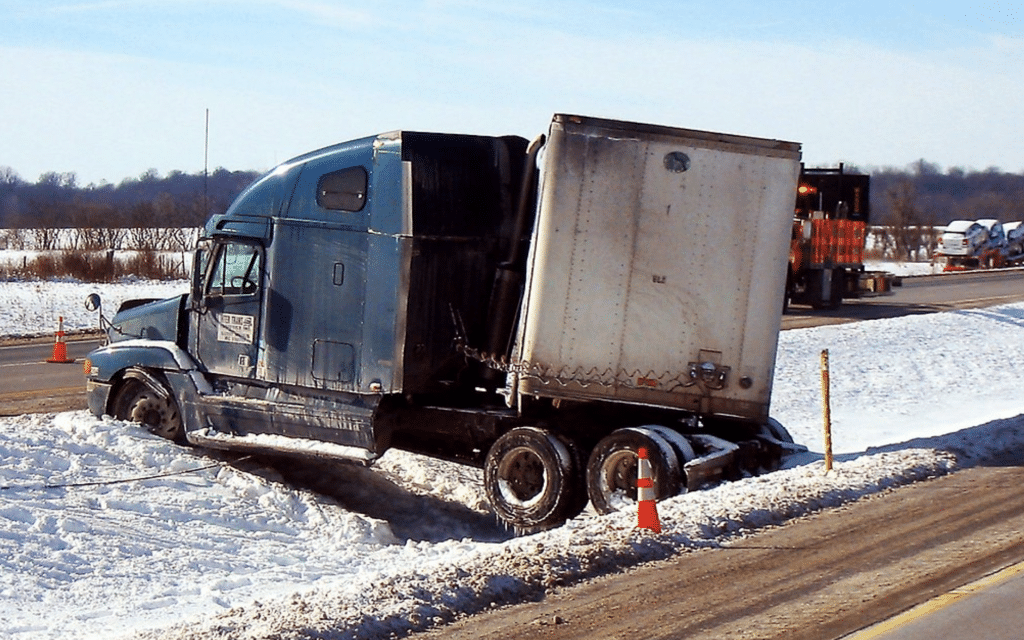South Carolina is home to over 850 miles of interstate highways, connecting coastal ports to trucking routes that carry billions of dollars of goods into and across the United States every year. Millions of tractor-trailer trucks pass through South Carolina, including those owned and operated by the nearly 8,000 trucking companies located in the state
It is inevitable that accidents with these trucks are bound to happen. One of the most terrifying and unexpected types of truck accidents is a “jackknife” accident. Because of the sudden timing of a jackknife accident, they can be hard to avoid as a passenger driver. The sheer size and weight of tractor-trailer trucks can easily result in a deadly accident.
If you were injured in a jackknife accident with a truck in South Carolina, you will want to know how the jackknife happened, and if you can file a claim for sustained damages. A South Carolina truck accident lawyer can help determine if negligence played a factor, and who to file a claim against.
What Happens When a Truck Jackknifes in South Carolina?
A jackknife accident occurs when the front of a truck and the trailer it is towing stop moving in unison. The truck and trailer will start going in different directions, but since they are connected, they form an “L” shape at an angle that resembles a folding blade knife.
A truck can jackknife for many reasons. Some are preventable, and some are entirely freak accidents. Once a truck jackknifes, it is very hard for a driver to regain control of the vehicle. A jackknifing truck can slam into other vehicles and careen off the side of the road.
What Can Cause a Truck to Jackknife in South Carolina?
A truck can jackknife for several reasons. These reasons all reduce the amount of traction the truck retains on the road, causing the truck to slide into a jackknife :
- Slippery road conditions: rain, ice, snow, or wet leaves cause the road to turn slippery. The truck has less traction on the road.
- Improper braking: a truck driver slams on the brakes too suddenly, locking up the front wheels while the back wheels are still moving.
- Speeding: a truck traveling at an unsafe speed is harder to stop and can cause more damage due to its sheer velocity. Even if the truck is not over the legal speed limit, other factors such as traffic or weather conditions should be taken into consideration by the truck driver when determining appropriate speed.
- Truck maintenance: an improperly maintained truck is more likely to jackknife, and these issues are easily preventable by the driver or trucking company. Worn-down tires or brakes, malfunctioning electrical systems, and mechanical issues are the responsibility of the driver or company.
- Inexperienced truck drivers: a truck driver who has less experience or who has not undergone proper training to operate the tractor-trailer will be more likely to jackknife with less ability to regain control of the vehicle.
- Fatigued or intoxicated truck drivers: if a driver is impaired, they should not be behind the wheel. A driver who is falling asleep or under the influence of drugs or alcohol will not only be held at fault for your jackknife accident, but can also face criminal charges.
Your South Carolina personal injury lawyer can conduct a thorough investigation into what caused the truck involved in your accident to jackknife, and if any of these causes were the result of negligence.
When is a Truck Driver at Fault for a Jackknife Accident on a South Carolina Highway?
If a truck jackknifes due to poor road conditions without any personal fault, then the driver or trucking company will not be held completely responsible for the accident. However, this is a rare situation; jackknifing occurs more often due to a mix of negligence and external conditions. A jackknife accident on a slippery road is more likely if the truck tires were worn down. This is negligence on behalf of the driver or trucking company.
Other jackknife accidents can occur as a direct result of the truck driver’s actions. If a driver was impaired, fatigued, not adequately licensed to operate the tractor-trailer, speeding, or disobeying traffic laws, they can be held at fault. A driver or trucking company can be held at fault if they failed to properly maintain the tractor-trailer.
Should I File a Claim Against the Truck Driver or the Trucking Company?
South Carolina follows a “comparative negligence” model for personal injury claims. This means that if you are determined to be under 50% responsible for your accident, you can file a claim and receive compensation for damages. Since it is the truck driver and trucking company’s responsibility to prevent jackknifing accidents, it would be nearly impossible for a jackknife accident to be your fault, assuming that you were obeying traffic laws, wearing a seatbelt, following safe driving practices, and were not driving under the influence.
A Columbia car accident lawyer can determine if the truck driver or trucking company, or both, can be held liable for the jackknife accident that caused your injury. Your lawyer can then file appropriate claims against the at-fault parties so you receive fairly deserved compensation for damages caused by a jackknifing truck. The truck driver, trucking company, and insurance companies will all point fingers at one another to avoid paying for the damages you sustained. A lawyer can help maximize the compensation you receive and file a lawsuit, if needed, all while helping you manage physical and financial recovery from the accident.
